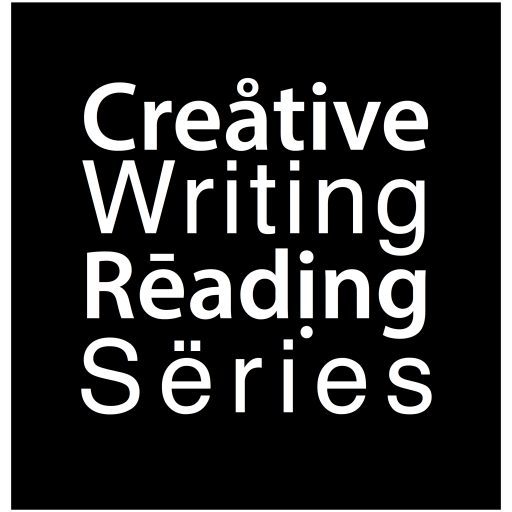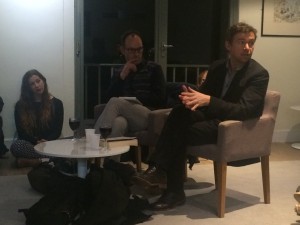David Nicholls kicked off the Creative Writing Reading Series for the Spring term, reading and discussing his novels and screenplays to a room packed to standing room only. David started the evening by reading the first page – and the first chapter – of his latest novel Us (Hodder & Stoughton, 2014): Douglas Petersen, Nicholls’s narrator, is woken in the middle of the night and told by his wife that she is leaving him. A grim end to start with, though the tone was resolutely comic – the way shocking news can often fail to register, being so outside daily experience that it can be incomprehensible, was deftly observed: Douglas at first thinks his wife is, as she often does, asking him to check for burglars, and so dutifully checks the house for intruders before she has to repeat herself to get the message across.
This beginning puts us in rather different territory to Nicholls’s previous novels which, though they similarly often focus on relationships, track the beginnings of romance in younger couples – as was the premise in One Day, which followed the protagonists’ relationship over twenty years from university into their early forties. Us, said Nicholls, is an older book – citing a mixture of parenthood and the fact that he didn’t feel as confident, now in his mid-forties, in writing as convincing a contemporary twenty-something as he could when he was twenty-something. This was the first time, he said, he had tried to write someone older than himself: Douglas is in his mid-fifties, and not only the birth of Nicholls’s children, but the death of his father – which occurred some months into the writing of Us – have clearly had their impact upon it, the novel’s emotional core turns, with a turn in point of view, to the father-son relationship between Douglas and his son Albie.
Pressed on this potential correspondence between life and art by Alex Preston, Nicholls talked in some depth about the relation of his father’s death to the final shape and focus of the novel – which is dedicated to him. Whilst insistent that his relationship with his father – though difficult and troubled – was not identical, or even particularly similar in fact to Douglas and Albie’s relationship, this did raise the question of whether it is possible to write something you haven’t thought or felt. Nicholls’s conclusion on this was to say ‘there isn’t a single moment [in the novel] where I could say ‘that happened’, yet [his relationship with his father] overshadows the writing’. He also pointed to his use of incidents, thoughts or emotions in his own life which he has used in his novels, but transposed, projected onto other characters, scenarios and relationships – if one cannot write something alien to one’s thoughts or feelings, those emotions are always twisted, or disguised, by the operations of fiction. Although his characters, he said, were hardly ever based on people he knows, ‘little bits of myself come through’. When he does use others, he said, it is often actors – because what he takes in trying to create a character isn’t so much incidents or personalities but performance, mannerisms or rhythm – a physicality. He gave the example of Rafe Spall, who inspired some aspects of Ian in One Day, then later played him in the film.
Despite this being in some ways an older novel than his previous books, this distinction is not altogether straightforward – Great Expectations, Nicholls pointed out (Nicholls’s referents and roots are in clearly in the nineteenth century realist novel, which can be seen not just from his content and style, but his epigrams – James, Hardy, and his screenwriting CV – adapting, among others, Tess of the D’Urbervilles and Far from the Madding Crowd for television), is always thought of as a book of youth, but it’s narrated by a 55 year old man. Similarly, Nicholls described Us as ‘a travelogue in place and time’: it has two presents at once. If we start in a point of time and space – Connie telling Douglass she is leaving him – we then get two stories, one about this break up, and one about their relationship, from when they first met.
Nicholls talked about how he had consciously attempts to keep himself on his toes following the successes of his previous books – if you have a success, he said, the temptation is either to do the same again, or to do something entirely different – the trick is to try to do something in between. In order to avoid predictability, and this was a point as much to do with genre as his relation to his other books, he has to play games with structure, to misdirect – which he often does with time structures and point of view. Point of view is clearly something that preoccupies him: Us is his second novel written in the first person, the first being Starter for Ten. Nicholls’s aim in Us for this point of view is the exact opposite of his previous use of it: whilst Brian in Starter for Ten has similarities to Nicholls, Douglas is rather different, Douglass’s character and occupation as a scientist allowed Nicholls to challenge his ability to write in the first person – he was interested, he said, in writing, in the form of fiction about someone who didn’t value fiction, in writing about art through someone who wasn’t confident doing so. In some ways, also, Nicholls said, he wanted Douglas to be an anti-Dexter, the male lead character in One Day, and writing him in the first rather than third person helped him create those distinctions. Nicholls talked too about the difficulties in narration of One Day – a narrative written in the third person past tense, which put pressure on his writing. In the first person, banality is allowed; the narrative is a reflection of a character’s personality. Third person doesn’t allow for this. A first person novel, however, requires a getting into character, the assumption of a voice. Tellingly, Nicholls said this was his quickest novel to write – nine months, but that it took him four years of writing to get to those nine months. The novel started out, he said, as a much more spiteful and angry book about father and son.
The book is written rather differently, too, from his previous novels, comprising of 180 short chapters- Nicholls said he wanted to aim for a series of vignettes, or snapshots, creating an impression like flicking through a family photo album. This particular form would seem to be heavily influenced, not only by the content of the book, but by Nicholls’s background as a screenwriter – your average screenplay, he said, comprises 180 short scenes, ruthlessly edited: in screenwriting you are constantly being asked by others ‘do we need this scene?’ – it is clear that he sees screenwriting as something which has given him concision. And plotting too – Nicholls talked about how, in adapting his books into screenplays, he would immediately give his team a scene-by-scene, chapter-by-chapter breakdown of action, something they seemed surprised to get from an author. But these plot-breakdowns seem to be essential to Nicholls’s writing: he can’t, write, at least well, he said, without having first prepared structure and plot – which also goes some way to explaining the time proportions of the planning and writing of this novel!
It was clear that Nicholls credits screenwriting with developing much of his ability and style as a novelist – he claims to be influenced by Woody Allen as much as Dickens – and he sees many of his authorial techniques as equivalent to filmic devices. He described his epigrams, for example, as equivalent to captions in a movie – suggesting a tone, creating a distance from the action. His dialogue, he said, is also more immediately sharper, improvisatory, and requires less editing than other aspects of his writing. However, he also talked about the difficulties he had in adapting his own books into films. Asked by a student what the goal is in adapting a book, he agreed that often fidelity is the enemy of a good adaptation – that you need to make something that works with the potentials of its own medium. For example, he said, during a scene where Emma and Dexter have an awful dinner in One Day, in the book, one can access Dexter asking himself why he’s acting like this. In a film, of course, this is unmanageable – you have to rely on the actor to do the novelist’s work, and if the screenwriter is too tied into the novel they perhaps won’t see how to make the transition work. He also expressed discomfort around genre – saying that initially he found it uncomfortable that he was pressured into changing the ending of Starter for Ten for the film into something that more closely resembled the genre of romantic comedy – in his novels, he said, he always tries to avoid, or play with, the expectations of genre. However, he said that the also feels the film needed to end that way, the expectations and structure of film demanded a different ending to that required by the novel. He’s wary, for example, he said of someone making a speech that changes someone’s mind, of the last-minute airport dash – no-one’s mind, he said, is ever changed by this in real life, but then, he said, this isn’t quite real life. Novels, and films, give meaning and structure to a life that doesn’t have that – one of the reasons that he often tries to undercut the reader’s expectations – sometimes, as in One Day and Us, very dramatically. We didn’t get to find out, in the case of Us, how dramatically, so we were left, as I now leave you, on a cliffhanger.

